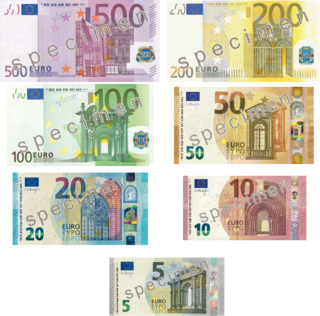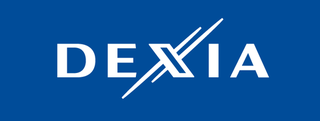
The Benelux Union is a politico-economic union of three neighbouring states in western Europe: Belgium, Netherlands and Luxembourg.

The euro is the official currency of 19 of the 28 member states of the European Union. This group of states is known as the eurozone or euro area, and counts about 343 million citizens as of 2019. The euro is the second largest and second most traded currency in the foreign exchange market after the United States dollar. The euro is subdivided into 100 cents.
There are eight euro coin denominations, ranging from one cent to two euros. The coins first came into use in 2002. They have a common reverse, portraying a map of Europe, but each country in the eurozone has its own design on the obverse, which means that each coin has a variety of different designs in circulation at once. Four European microstates which use the euro as their currency also have the right to mint coins with their own designs on the obverse side.
Belgian euro coins feature only a single design for all eight coins: the portrait or effigy of the incumbent King of the Belgians. Previously, all Belgian euros depicted King Albert II and his royal monogram. Current coins depict King Philippe. Also part of the design by Jan Alfons Keustermans are the 12 stars of the EU and the year of imprint.

Hasselt is a Flemish city and municipality, and capital of the province of Limburg in Belgium. The Hasselt municipality includes the original city of Hasselt, plus the old communes of Sint-Lambrechts-Herk, Wimmertingen, Kermt, Spalbeek, Kuringen, Stokrooie, Stevoort and Runkst, as well as the hamlets and parishes of Kiewit, Godsheide and Rapertingen.
A federated state is a territorial and constitutional community forming part of a federation. Such states differ from fully sovereign states, in that they do not have full sovereign powers, as the sovereign powers have been divided between the federated states and the central or federal government. Importantly, federated states do not have standing as entities of international law. Instead, the federal union as a single entity is the sovereign state for purposes of international law. Depending on the constitutional structure of a particular federation, a federated state can hold various degrees of legislative, judicial and administrative jurisdiction over a defined geographic territory and is a form of regional government.

The ING Group is a Dutch multinational banking and financial services corporation headquartered in Amsterdam. Its primary businesses are retail banking, direct banking, commercial banking, investment banking, asset management, and insurance services. ING is an abbreviation for Internationale Nederlanden Groep.
BNP Paribas S.A. is a French international banking group. It is the world's 8th largest bank by total assets, and currently operates with a presence in 77 countries. It was formed through the merger of Banque Nationale de Paris (BNP) and Paribas in 2000, but has a corporate identity stretching back to its first foundation in 1848 as a national bank. It is one of three major international French banks, along with Société Générale and Crédit Agricole. The group is listed on the first market of Euronext Paris and a component of the Euro Stoxx 50 stock market index, while it also included in the French CAC 40 index.

A gold reserve was the gold held by a national central bank, intended mainly as a guarantee to redeem promises to pay depositors, note holders, or trading peers, during the eras of the gold standard, and also as a store of value, or to support the value of the national currency.
Fortis N.V./S.A. was a Belgian financial company active in insurance, banking and investment management. In 2007 it was the 20th largest financial services business in the world by revenue but after encountering severe problems in the financial crisis of 2008, most of the company was sold in parts, with only insurance activities remaining.

The Belgian franc was the currency of the Kingdom of Belgium from 1832 until 2002 when the Euro was introduced. It was subdivided into 100 subunits, known as centiemen (Dutch), centimes (French) or Centime (German).

The Luxembourgish franc was the currency of Luxembourg between 1854 and 1999. The franc remained in circulation until 2002, when it was replaced by the euro. During the period 1999–2002, the franc was officially a subdivision of the euro but the euro did not circulate. Under the principle of "no obligation and no prohibition", financial transactions could be conducted in euros and francs, but physical payments could only be made in francs, as euro notes and coins were not available yet.
The franc is the currency of Burundi. It is nominally subdivided into 100 centimes, although coins have never been issued in centimes since Burundi began issuing its own currency. Only during the period when Burundi used the Belgian Congo franc were centime coins issued.

The Rwandan franc is the currency of Rwanda. It is subdivided into 100 centimes.

Dexia N.V./S.A., also referred to as the Dexia Group, was a Franco-Belgian financial institution active in public finance, providing retail and commercial banking services to individuals and SMEs, asset management, and insurance; with headquarters in Saint-Josse-ten-Noode, Brussels. The company had about 35,200 members of staff and a core shareholders' equity of €19.2 billion, as of 31 December 2010, and provided governments and local public finance operators with banking and other financial services. Asset Management and Services provided asset management, investor and insurance services, in particular to clients of the two other business lines.

The 10 euro cent coin (€0.10) has a value of one tenth of a euro and is composed of an alloy called Nordic gold. All coins have a common reverse side and country-specific national sides. The coin has been used since 2002, with the present common side design dating from 2007.

The National Bank of Rwanda is the central bank of Rwanda. The bank was founded in 1964. The current governor of the bank is John Rwangombwa
The 2008–2009 Belgian financial crisis is a major financial crisis that hit Belgium from mid-2008 onwards. Two of the country's largest banks – Fortis and Dexia – started to face severe problems, exacerbated by the financial problems hitting other banks around the world. The value of their stocks plunged. The government managed the situation by bailouts, selling off or nationalizing banks, providing bank guarantees and extending the deposit insurance. Eventually Fortis was split into two parts. The Dutch part was nationalized, while the Belgian part was sold to the French bank BNP Paribas. Dexia group was dismantled, Dexia Bank Belgium was nationalized.












